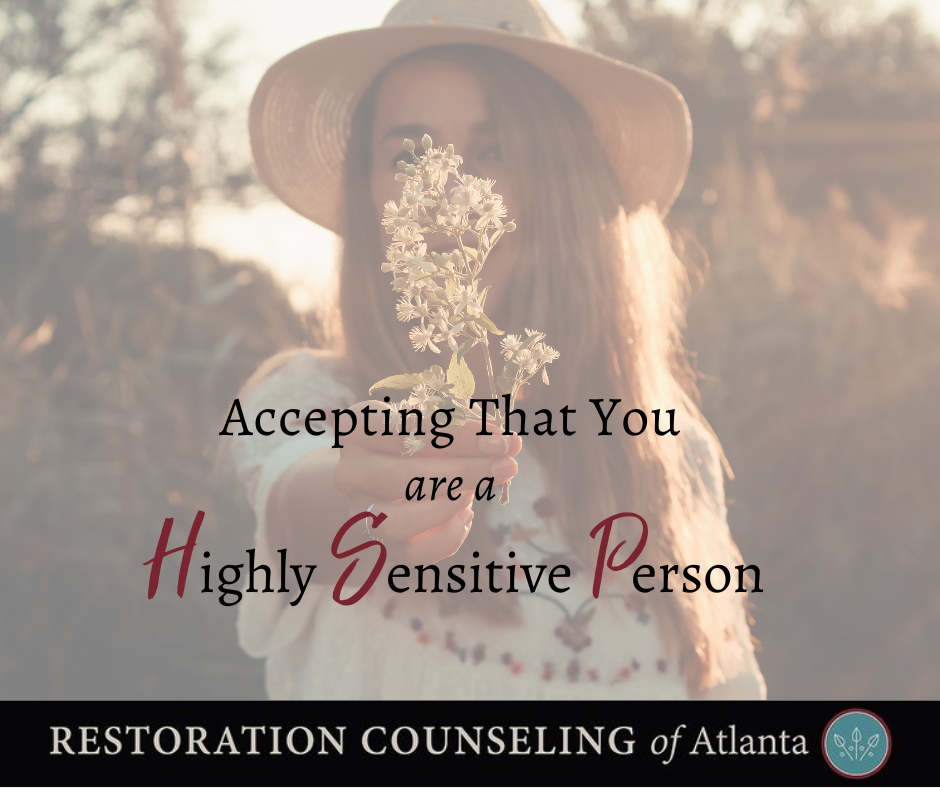I work with many highly sensitive people as a therapist. They don’t often come to me because they are highly sensitive, but we discover somewhere in the therapeutic process that they have the highly sensitive trait. More often than not, the initial reaction is one of relief. People are excited to have a name for the deep empathy and sensitivity they feel, and they are even more excited that they are not alone.
The reason they are happy that they are not alone is that often highly sensitive people feel as though they are weird or an outsider. They tend to think something is wrong with them and that if they could just be less sensitive, they wouldn’t struggle. My favorite quote about highly sensitive people comes from a TED talk by Elena Herdieckerhoff about the gentle power of highly sensitive people. She says, “Every time you tell an HSP they are too sensitive, it’s like telling someone with blue eyes that their eyes are too blue.” You can not change the fact that you are sensitive, no matter how hard you try. You may have found coping skills and ways to hide your sensitivity, but it lives inside of you whether you acknowledge it or not.
Although highly sensitive people are initially relieved that they are highly sensitive, I find that the relief typically does not last. As they begin to conceptualize and wrestle with the fact that they are highly sensitive, I find that shame often shows up. Highly sensitive people have typically been told their whole lives that they are too sensitive. When you are told you are “too sensitive” over and over, you learn that sensitivity is not welcomed, and that you should be ashamed of it. Because of shame, relief turns into frustration because you can never turn this part of you off. Therefore, I find that one of the first and most profound things you can do as a highly sensitive person is accept the fact that you are a highly sensitive person.
Acceptance sounds nice, in theory. Everybody, or most people, want to feel as though they are fully accepting of themselves, but there are subtle cues that can show that you are hiding or feeling ashamed of your sensitivity:
- Not sharing certain emotions, especially ones that betray your sensitivity (hurt, sadness, anger, etc.)
- Avoiding places where your sensitivity may present itself
- Denying that you are sensitive altogether
- Thinking that you are weak
- Wishing that you were more like other people
- Feeling like no one understands you
So, how do you accept that you are highly sensitive? It takes time and patience, but here are some ideas to help move the process along.
Remind yourself what is good about being highly sensitive. Being highly sensitive is a superpower! You have more empathy than the average person, which means that you make people feel seen and known in a way that other people aren’t able to. Your constant processing can bring a lot of wisdom. Your sensitivity to the world around you can make you a really good partner, friend, employee, etc.
Embrace and accept the challenges that come with being highly sensitive. Your overstimulation will get the best of you sometimes. You will feel feelings deeply, which can be uncomfortable. Your deep processing may lead you to overthink at times. The pain is the other side of the coin to the beauty.
Let go of what you cannot control. This is something I tell everybody, whether they are sensitive or not. But HSPs need to remember that they absolutely cannot control or change the fact that they are highly sensitive and let go of any notion that this part of them will ever change.
Practice self-compassion. I mean really practice it. It sounds nice to read that, but practicing self-compassion is a constant choice that can be very difficult. Find something that works for you and tell yourself multiple times a day. Some examples are:
- I am highly sensitive, and I am enough
- My sensitivity is a gift
- My feelings are okay, acceptable, and normal
Make friends with other HSPs. We make up 20% of the population, so you are bound to know at least one other person who is an HSP. Sometimes I will listen for clues that someone is an HSP, like someone who is highly empathetic or seems to notice details in the environment around them. Sometimes I will mention to people that I am an HSP and see if they know or relate to what it is.
Shame can be strong. It’s also shame’s job to make it so that you hide yourself. Don’t let shame win. Being an HSP is a wonderful gift that the world needs. My final question to you that I hope helps you accept and embrace being an HSP is – how can you use your sensitivity to make the world, your life, the people around you, better?
 Written by Ashley Skinner, MA, APC
Written by Ashley Skinner, MA, APC
Woodstock Location
ashley@restorationcounselingatl.com ext 119
Ashley Skinner takes an approach to therapy that begins with an empathic and calming presence. She is passionate about helping you tell your story while giving you practical tools to deal with your everyday struggles. Ashley helps adults dealing with anxiety, depression, grief, childhood trauma, and high sensitivity utilizing an eclectic approach that includes ACT, CBT, and mindfulness.

